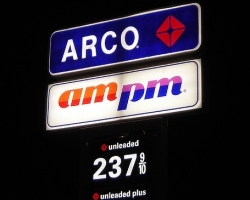The next ARCO/Bridgeport neighborhood meeting will be held Wednesday night, Jan. 27 in the Senior Center on Electric Avenue, adjacent to the Mary Wilson Library.
ARCO Representatives of the county, the city and Atlantic Richfield Company will update Bridgeport residents on decontamination efforts near the gas station on Pacific Coast Highway.
In related news, during a meeting with Seal Beach officials, on Friday morning, Jan. 15, Orange County Health Care Agency representatives said displaced Bridgeport residents will be able to move back into their homes in the near future. If this proves true, the displaced Bridgeport families may be told some time this week if they can go home. County officials said they would be notified Tuesday, Jan. 19 or Wednesday, Jan. 20.
The Sun Newspapers went to press before the families could have been notified.
County and Seal Beach officials were not the only ones who participated in the meeting, which included representatives of Atlantic Richfield Company/BP America, an unnamed representative from the California Office of Environmental Human Health Assessments and consultants hired by the various corporations and cities.
In all, at least 14 people participated in the conference either by telephone or in person.
Carmany told the Sun Newspapers Friday afternoon that the health risk data indicated people would be able to return to their homes.
According to the minutes of the meeting, compiled by Carmany, “the imminent health risks potentially identified at the four Bridgeport homes after preliminary sampling appears to be significantly lessened, although the Health Care Agency has not yet completed its review of three specific risk assessments provided to it earlier this week. OC HCA will also review the comments of the city of Seal Beach.”
Earlier in the week, Richard Sanchez of the OC Health Care Agency said the county had recommended four Bridgeport families living near the ARCO gas station on Pacific Coast Highway relocate because of potential health risks. Sanchez confirmed that three families had relocated. He said the agency wasn’t sure about whether the fourth family had relocated.
“We recommended it (the relocation),”
In 2003, there was a leak from a tank at the gas station. Recently, gas vapors had been detected in the soil. Gasoline vapors contain benzene, which is a carcinogen—a substance known to increase the risk that someone might develop cancer.
“The health risk assessment may indicate that the residents will be able to move back in based on data showing it is safe to do so. If so, this will be communicated to the affected residents next Tuesday or Wednesday,” Carmany’s notes said.
Anothony Martinez, of the Health Care Agency, said ARCO had expanded its extraction system for removing the contamination from soil in the neighborhood near the gas station and it seemed to be working.
Air sampling an issue
County health officials have developed their health assessments based on samples taken from beneath the slabs of Bridgeport homes. Most Bridgeport homes are apparently built on a slab foundation.
“Our focus has been more on what’s underground,” Sanchez said.
However, the city of Seal Beach raised questions earlier last week about whether ARCO/BP America had been following state-mandated procedures for taking air samples inside Bridgeport homes. Forty-five homes have been tested so far, 15 in the “study area” near the gas station.
The city of Seal Beach wrote a letter to the county health agency addressing this concern on Wednesday, Jan. 13.
In an e-mail to the Sun Newspapers, Tom Mueller, press officer for BP America wrote: “The issues raised in the letter from Seal Beach are mostly around misunderstandings of the sampling protocols we used or misinterpretation of state guidelines for taking samples.”
Mueller argued that the living room was the best place for taking air samples. The Seal Beach letter of Jan. 13 argued the living room was not the best place for taking the air samples.
In his e-mail, Mueller pointed out that the air sampling plan had been approved by the California Office of Environmental Health Assessment.
Mueller wrote that results showed “nearly all homes tested were below screening levels for concern.”
Mueller said a new vapor removal system was temporarily connected and turned on Friday, Jan. 8. He said the system seemed to be working.
The same issues were raised in a formal reply to the Seal Beach letter from ARCO/BP America.
Carmany told the Sun that ARCO officials believe they are complying with both the spirit and the letter of state air sampling guidelines and at this time he is inclined to take them at their word.
Carmany said it was the city’s role to make sure ARCO does its job cleaning up the sight.
Planning ahead
Carmany said Seal Beach officials are looking at all the options available, including physically removing all the contaminated soil, new zoning regulations and possibly a nuisance abatement action against the PCH ARCO station. ARCO has indicated it does not intend to close down the gas station.
Carmany said a complicating factor is that the contamination is not following the pattern you would expect. He described the path of contamination as a “hop scotch effect,” possibly caused by the composition of Bridgeport area soil—a combination of clay and sand.
He said it was possible the vapors are migrating along utility lines.
Carmany pointed out that before 2009, the county had considered the site a low priority for decontamination.
Carmany said that the decontamination efforts had become nearly a full time job. “It’s been all ARCO, all the time,” he said.












